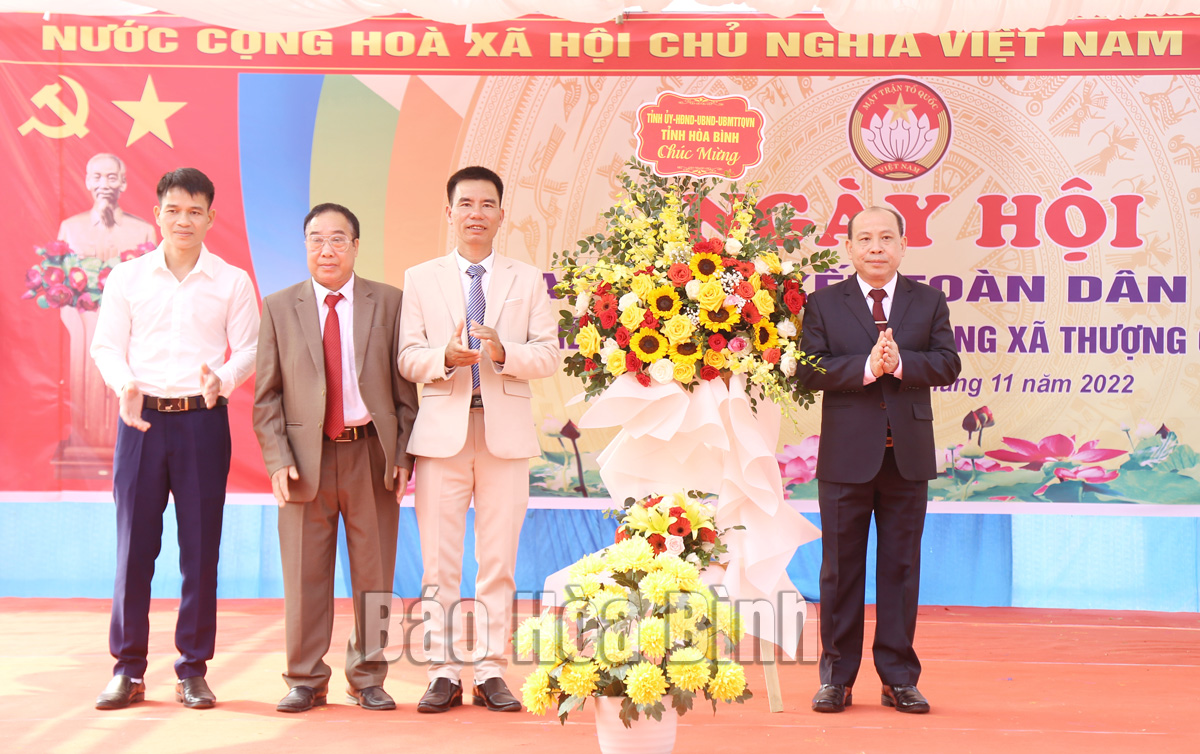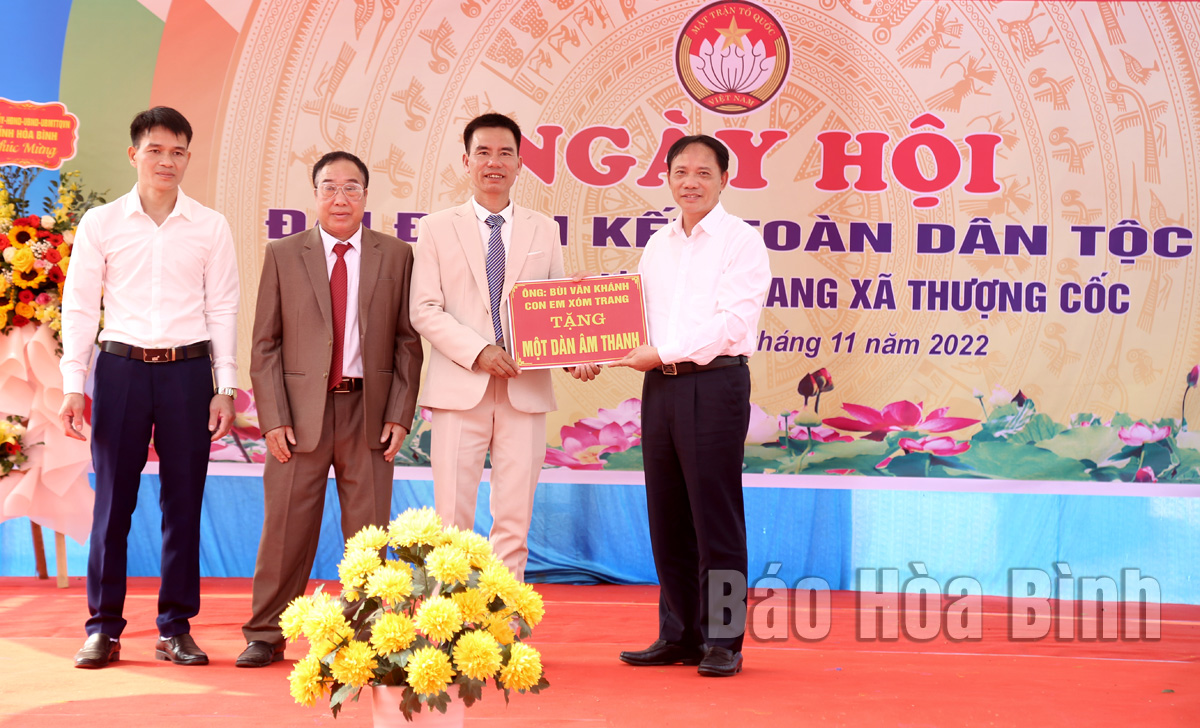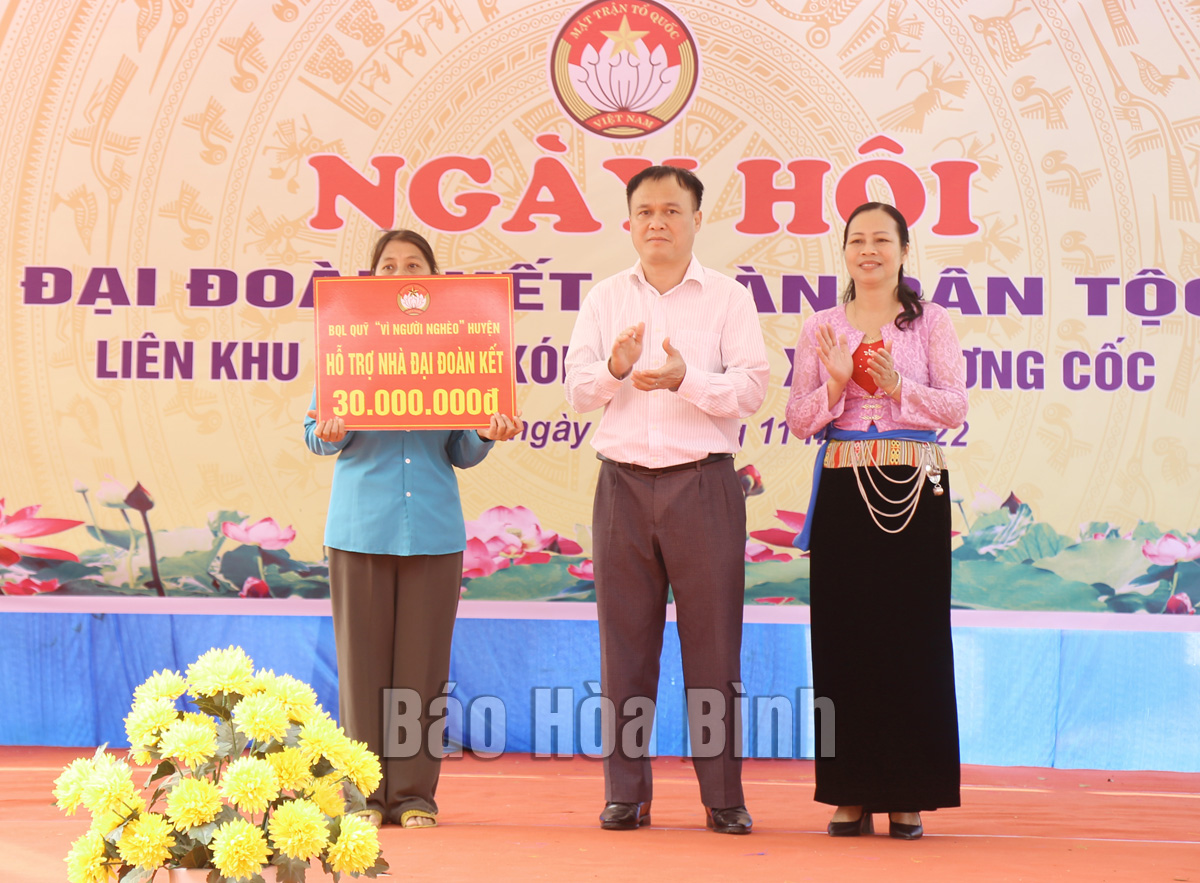
(HBO) - A great national unity festival was held in Trang hamlet in Thuong Coc commune of Lac Son district on November 8.
Deputy
Secretary of the provincial Party Committee and Chairman of the provincial
People’s Council Bui Duc Hinh, Deputy Secretary of the Party Committee and
Chairman of the People’s Committee Bui Van Khanh, officials from the provincial
Party Committee’s Organisarion Board, representatives of the Vietnam Fatherland
Front Committee of Hoa Binh province, and local departments and sectors attended
the event.
Deputy Secretary of the
provincial Party Committee and Chairman of the provincial People’s Council Bui
Duc Hinh presents flowers to representatives of the residential area.
Deputy Secretary of the Party Committee and Chairman of the People’s
Committee Bui Van Khanh presents gifts to representatives of the residential
area.
Speaking at the event, Deputy Secretary of the provincial Party Committee and
Chairman of the provincial People’s Council Bui Duc Hinh, praised the residential
area for its achievements, expressing his hope that local people will continue
to promote unity and overcome difficulties to well perform campaigns and
patriotic emulation movements, thus contributing to further promoting the great
national unity bloc and cultural and socio-economic development.
Trang hamlet is home to 288 households with 1,240 people, 98% of them are Muong
ethnic minority people. Residents in the hamlet have worked hard on promoting
the tradition of solidarity and patriotic emulation and the economic
development movement and social activities.
100% of households in the hamlet implemented the merging and exchange of land
plots with a total area of over 14 ha. Locals also donated over 1.9ha of land
for building rural roads.
The per capita income in the hamlet is 40 million VND per year. The rate of
poor households decreased to 14%. All children of school age have gained access
to education.
A representative of the Party
Committee of Lac Son district hands over donations for building charitable
houses for poor households in the hamlet.
On the occasion, the residential area of the hamlet received gifts of the
provincial Party Committee, People’s Committee and the Vietnam Fatherland Front
Committee of Hoa Binh province, and local sectors.
Two poor households in the hamlet received donations for building houses, while
70 others being awarded certificates of merit for their typical achievements in
the hamlet’s front work./.
Hoa Binh province is undergoing a dynamic transformation amid Vietnam’s national digital transition. Building on Poliburo’s Resolution No. 57-NQ/TW on breakthroughs in science, technology, innovation, and national digital transformation, the province has rolled out a wide range of practical action plans. A standout initiative is the "Digital Literacy for All” movement, an effort to ensure that no one is left behind in the digital era.
Hoa Binh province is undergoing a dynamic transformation in the wake of the national digital transformation movement. Building on Resolution No. 57-NQ/TW of the Politburo on breakthroughs in science, technology, innovation, and national digital transformation, the province has implemented a wide range of practical action plans. A standout initiative is the "Digital Literacy for All” movement ambitious effort to ensure that no one is left behind in the digital age.
With a spirit of unity and proactive problem-solving, the Party Committee, the government and the people of Dong Lai Commune (Tan Lac District) have made great strides in implementing the resolutions of the 24th Party Congress of the commune for the 2020 - 2025 term. Focusing on leadership and practical actions, the commune has brought the Party’s resolutions into daily life, creating strong impacts and pushing the local development forward.
Amid the nationwide push for digital transformation, young people in Hoa Binh Province are stepping up as dynamic pioneers, applying technology to enhance Youth Union operations and expand the reach of youth-led initiatives. Through creativity and adaptability, Youth Union organizations at all levels have introduced a series of practical solutions, contributing to modern governance and community development.
In recent years, An Nghia commune, located in Lac Son district, has stepped up administrative reform, focusing on improving the quality and efficiency of its single-window service unit for receiving and processing administrative procedures. These improvements have helped create favourable conditions for local residents and organisations to handle administrative procedures, contributing to the commune’s broader socio-economic development.
The Prime Minister-approved master plan to develop the multi-use value of forests ecosystems through 2030, with a vision to 2050, aims to improve the management and sustainable use of forest resources, create jobs, increase incomes, and improve the living standards of ethnic minorities, people in mountainous and remote areas, forest workers and those living near forests.





